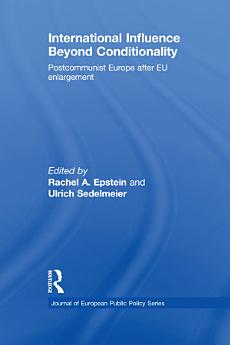International Influence Beyond Conditionality: Postcommunist Europe after EU enlargement
About this ebook
This volume challenges much of the existing work on EU enlargement and postcommunist transition, however, by testing the conditionality thesis in the post-accession setting. Whereas a conditionality hypothesis would predict deteriorating compliance among the newest member states, several contributions here actually find the opposite. Enduring compliance among postcommunist states with the acquis, as well as with less formally institutionalized EU preferences for economic liberalization and minority protection, calls into question the role that conditionality plays in eliciting conformity. Simultaneously, support for the conditionality hypothesis in areas such as political party development and EU relations with Turkey and the western Balkans suggests conditionality’s effects vary across countries and issues. As the first study to systematically examine the relationship between international institutions and postcommunist states after enlargement, this volume provides new insights into how external actors exercise their power in domestic politics.
This book was published as a special issue of the Journal of European Public Policy.
About the author
Rachel A. Epstein is an associate professor of political economy and European politics at the Josef Korbel School of International Studies at the University of Denver. She has written widely on the role of international institutions in denationalizing defense and financial policy in Europe and is the author of In Pursuit of Liberalism: International Institutions in Postcommunist Europe (Johns Hopkins University Press, 2008).
Ulrich Sedelmeier is Senior Lecturer in International Relations at the London School of Economics and Political Science. He is the author of Constructing the Path to Eastern Enlargement (Manchester University Press, 2005) and co-editor of The Politics of European Union Enlargement: Theoretical Approaches (Routledge, 2005).







